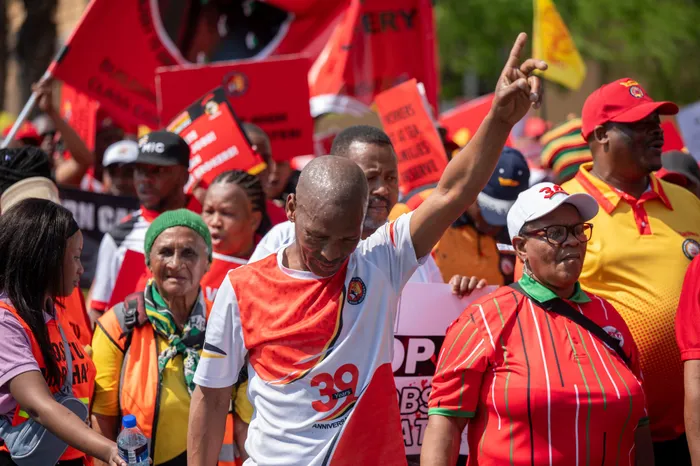Cosatu-led march calls for better treatment of workers

Cosatu members embark on a march through the CBD. Photographer: Armand Hough / Independent Newspapers
Cape Town - Hundreds of people, part of several trade unions and supported by civil organisations, marched during the Congress of SA Trade Unions’s (Cosatu) National Day of Action yesterday, bringing the demands of workers to the legislature and Parliament in Cape Town.
The march of around 300-400 people from Hanover Street, District Six, to Wale Street, and then Parliament, took place on World Day for Decent Work, commemorated annually on October 7.
The action was also a protected strike, Cosatu said, ahead of the action across Cape Town, Durban, and Johannesburg.
Cosatu Western Cape provincial secretary, Malvern de Bruyn said: “Cosatu is having this every year and our main issue is about job creation, decent jobs, sustainable jobs, etc.”
The national strike had a number of objectives.
As stated by the federation, these included calls for attacks on collective bargaining in all sectors to stop; preventing crime and corruption; reducing high interest rates; addressing high and increasing cost of living; stopping job losses and privatisation; addressing high unemployment; and the creation of decent jobs.
De Bruyn called for a re-prioritisation of the budget in order to mitigate these challenges.
The federation called for the speedy implementation of the Zondo Commission recommendations; the government to stop misplaced pursuit of austerity measures; business and government to agree with Cosatu labour law reforms demands; demands for a People’s Budget; the immediate implementation of the National Health Insurance; and to stop gender-based violence in the workplace.
National Union of Mineworkers (NUM) regional chairperson, Mkululi Pakade, said their concerns related largely to the bargaining council processes and with delays from the minister in signing once an agreement had been reached.
Pakade said employers also preferred to employ and exploit foreign nationals for cheap labour, many of whom were undocumented.
Thembeka Majali, Alternative Information and Development Centre programme officer, of Cry of the Xcluded, said there should be an end to budget cuts and called for wage increases.
A memorandum of demands was handed over to a representative from the legislature.
When there, a large group of pro-Palestine supporters were outside, with calls from the unions to have the two merge, noting the struggle in solidarity was related.
However, this was not made possible due to a number of police vehicles between the two groups.
Muslim Judicial Council SA president, Shaykh Riad Fataar, however, joined the workers to offer words of support.
“Just like we are facing crime and corruption and gangsterism, the Palestinian people and Gazan people are under genocide and we are a people in South Africa, we stand for justice.
“We stand with the oppressed people, so therefore honour to you, the workers of South Africa.”
In a statement, Premier Alan Winde said the Western Cape Government shared many of Cosatu’s concerns.
“Weak and devastatingly low economic growth, South Africa’s high unemployment rate, and elevated levels of crime are impeding our efforts to reduce poverty, especially for our most vulnerable residents,” Winde said.
“But it makes no sense calling a strike on a weekday.
“This is counter-productive. Instead, we need to double down to resuscitate economic growth. Protest is a key pillar of our democracy, but industrial action does not help us to jumpstart growth and create more jobs.
“I am pleased that other services have not been significantly disrupted.”
shakirah.thebus@inl.co.za
Cape Argus
Related Topics: